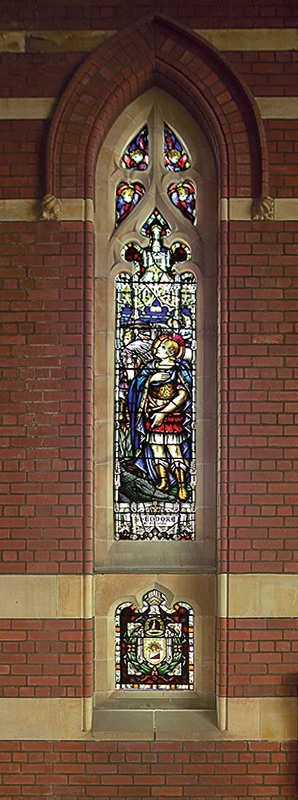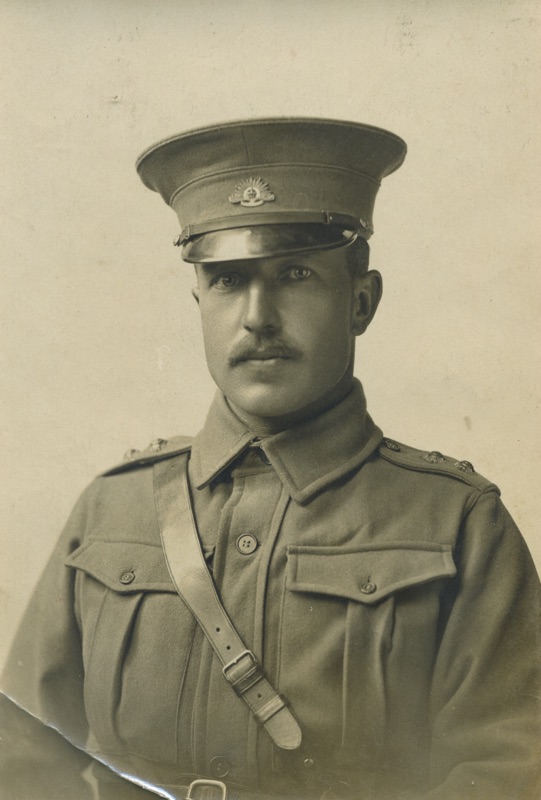Katherine Smith speaks with Trinity College Curator Ben Thomas about the involvement of its students and alumni in WW1.
In 1914 the student community of the University of Melbourne was a different creature from the culturally diverse one we see today on campus.
Overwhelmingly male and comprised largely of Victoria’s ‘establishment’ youth, those young men and few young women embodied all the expectations of their elders for the fulfilment of senior social and professional positions in the young state.
Modelled as the University was on the ‘Oxbridge’ tradition, many of these students lived on campus in church-affiliated colleges, Trinity College being first among the prestigious institutions - the recipient of young male students from the dominant Church of England social circle.
The year war broke out coincided also with placement of the foundation stone of the College’s beautiful art nouveau chapel, designed by notable Tasmanian architect Alexander North and which was to incorporate native timbers, carved with depictions of Australian flora and fauna.
The intention to use nationalist emblems to decorate the new chapel retrospectively seems at odds with the fate that befell many of the young students over the next few years, as they travelled from the fringes of Empire to fight a war in defence of a country to which they no doubt felt a deep connection, but which was not their own.

in the Trinity Chapel.
By the time the completed Chapel was consecrated in 1917, it already included stained glass memorial windows to some of the College’s fallen - one of the earliest examples of First World War memorial leadlight in Australia.
Warden from 1876 until 1918, Dr Alexander Leeper led Trinity through the war years, says Rusden Curator of the College’s Cultural Collections Dr Benjamin Thomas.
“Because of his long tenure, we know that Dr Leeper would have personally known all of those Trinitarian students and alumni who served in WW1,” Dr Thomas says, “which makes the pain he must have experienced over the next four years as news of the deaths of these men came back to the College all the more devastating.”
He points out that in it’s October edition, the College magazine Fleur de Lys noted ‘The call for volunteers has been nobly responded to by Trinity men and the College has the honour of contributing eight men from the fifty at present in residence and four from those who have recently left.’
The College began to experience losses early the following year, when Osborne O’Hara (TC 1904) was killed on 13 February 1915.
“By 1918, when Leeper was on the verge of retiring, the number of students and alumni that had served during the course of the war was estimated to be in the order of 283,” Dr Thomas says.
“Of these, 37 laid down their lives (the final number was in fact 41, with several men dying after their return from complications of war wounds), while 57 were decorated and 28 mentioned in dispatches (meaning they were deserving of special mention for gallantry in the face of the enemy).”
Among the fallen were six who died during the Gallipoli campaign, including one described by Dr Thomas as ‘arguably the most significant’ of the College alumni, Robert Bage, who graduated from the University with a Bachelor of Civil Engineering in 1910.

“Bage had accompanied Douglas Mawson to Antarctica only a few years earlier,” Dr Thomas says.
“He had a keen interest in the military, having joined the Australian Engineers shortly before joining Mawson’s expedition. The College magazine remembered him at that point as ‘“Bustling Bob,” of infamous memory’, while expedition member Charles Laseron would later write that Bage’s ‘quiet determination, resolution, and foresight carried them through … always cheerful, ready with a hand to anybody who needed it … he was a born leader of men’.”
Dr Thomas says one of Bage’s tasks in Antarctica, was the grim job of forming, with five others, a search party for Mawson and a detail from the expedition who had failed to return to their Cape Denison base as expected after a trek to the interior.
Grim because while the search party remained, the rest of the Cape Denison staff left Antarctica on the last ship of the season, before weather closed travel for a year, and a long, dark Antarctic winter.
Though members of his team perished on their journey into the Antarctic interior, Mawson arrived back at Cape Denison only two hours after the Aurora’s departure: the group were to spend another year on expedition, and explored more of the geology and geography of the western Antarctic coast.
Having returned to Australia after two years in Antartica, Bage rejoined his unit at the beginning of September 1914 and sailed to the Mediterranean.
“He was killed within weeks of the landing at Gallipoli having been sent out to mark a new forward position for a frontline trench in broad daylight, under Turkish machine gun positions,” Dr Thomas says.
“His proposal that it was a task better undertaken with the cover of darkness was ignored, and he resigned himself to what was essentially a suicidal mission.”
Dr Thomas says many other stories of those students who died during the war are equally poignant and are revered still as part of College tradition.
Despite the untimely end of these young lives and the potential they embodied, Dr Thomas says the fortitude with which the College bore the loss was both “remarkable and typical of the day”.
In an article in the Argus newspaper in July 1918 Alexander Leeper wrote:
No institution in the land can show a better record in the matter of volunteering for the war. As a result, Trinity was reduced to much less than half its normal numbers, and was brought into acute financial difficulties. … Personally I feel great pride that the College was reduced to such straits for so honourable a reason. Its record of war service makes the most glorious page in its history. Its financial difficulties will soon pass and be forgotten; but the memory of what Trinity did for the Empire in the Great War will be immortal.
Robert Bage’s Antarctic papers form part of the Newman College Collections on campus at the University of Melbourne.
Trinity College's Evensong: War and Peace series is running in April and May.